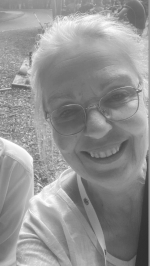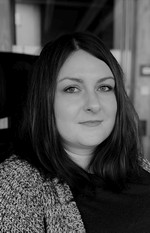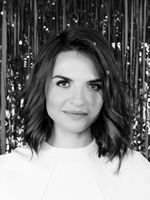Project Team
CORNELIA MUELLER (EUV, Co-Head of the Project)

Cornelia Müller (EUV, Co-Head of the Project) is Professor of Language Use and Multimodal Communication at European University Viadrina, Frankfurt (Oder). She has published on multimodal forms of language use, focusing on gesture as an expressive medium (motivation and conventionalization), on embodied processes of multimodal communication, and on the experiential dynamics of metaphorical meaning in speech, gesture, and audiovisual media. Recently, she has collaborated with film studies and further developed the concept of expressive movement to account for the interaffective grounding of meaning-making in media and face-to-face contexts. This inspired explorations of the film-analytical concept of expressive movement (Kappelhoff 2004) and its applicability to face-to-face interaction which resulted in a recently published transdisciplinary framework for the analysis of cinematic and multimodal metaphor (Müller & Kappelhoff 2018; Greifenstein et al. 2018). She directed several research projects: 2006–2011 „Towards a grammar of gesture: evolution, brain and linguistic structures” (VolkswagenStiftung), 2007–2012 she was PI at Languages of Emotion (research center Freie Universität Berlin), where she co-directed the project “Multimodal Metaphor and Expressive Movement”, and directed „B.A.L.I. 2: Language and gesture of alexithymia”. 2009–2013 she directed „Emergence of meaning in speech and gesture” (BMBF). As fellow of Cinepoetics Center for Advanced Film Studies, Freie Universität Berlin, she co-directed its work on ‘Film Images, Cinematic Thinking, and Cognition’ (2015/16, with H. Kappelhoff, M. Wedel).
MACIEJ KARPIŃSKI (AMU, Co-Head of the Project)

Maciej Karpiński (PhD, AMU Professor) is phonetician and a psycholinguist doing research in the perception and pragmatic aspects of speech prosody, paralinguistic features of speech, multimodal communication, and exploring links between speech and music. He received a PhD in general linguistics (1998) and a habilitation degree in applied linguistics (2007) from Adam Mickiewicz University in Poznań. Head, team leader or principal investigator in a number of research projects in the area of prosody and multimodal communication, e.g., Borderland: Boundaries of Language – Language of Boundaries. Paralinguistic Aspects of Intercultural Communication; NeuroPerKog: Phonological hearing and working memory development in infants and children, PAGE: Prosodic and Gestural Entrainment in Conversational Interaction across Diverse Languages; DiaGest2: Verbal and Non-verbal Interaction in Task-oriented Dialogues. Models of multimodal dialogue acts; Pol’n’Asia: Intonation and Tone in Korean, Polish, Thai and Vietnamese Task-oriented Dialogues, PoInt: Polish Intonation Database. He also took part in projects dedicated to endangered languages and cultures, and to linguistic resources (Heritage: Linguistic Heritage of Rzeczpospolita. Documentation base for endangered languages; INNET: Innovative Infrastructure for Endangered Languages). Presently, he is the Head of the Department of Multimodal Communication at the Institute of Applied Linguistics, Adam Mickiewicz University in Poznań.
MARTA GOMOLLA (AMU)
EWA JARMOŁOWICZ-NOWIKOW (AMU)

Ewa Jarmołowicz-Nowikow, PhD Habil. – an assisstant professor at the Faculty of Modern Languages, Institute of Linguistics, Dept. of Multimodal Communication at AMU. Her research interests focus on multimodal analysis, in particular its non-verbal dimension. She has taken part in several research projects on multimodal discourse analysis, in which she was responsible for annotation and analysis of nonverbal behaviour. Her publications concentrate on nonverbal aspect of communication from the developmental and cultural perspectives, and on the role of gesture. In Mumostance she coordinates the annotation process for Polish data with respect to the visual component (expressive movements and gesture) and conducts analyses of nonverbal behaviour based on the MumoStance corpus.
JANA JUNGE (EUV)
Jana Junge studies the master „Language – Media – Society” and is a student assistant at the professorship of Language Use and Multimodal Communication at the European University Viadrina, Frankfurt (Oder). Her bachelor thesis takes on the discussion of different concepts of language, namely universalism and relativism, and analyses Jurgen Trabant’s approach to this discussion with his neo-humboldtian view. She is especially interested in multimodal meaning-making, affect dynamics, embodiment, media linguistics and language theory. In the DFG funded interdisciplinary project “Multimodal Stancetaking: Expressive Movement and Affective Stance. Political Debates in the German Bundestag and the Polish Sejm” of the BEETHOVEN Classic 3 – Polish-German Funding Initiative she helps with the adaptation and execution of the analysis of the german data set.
HANNA KASPEREK (AMU)

Hanna Kasperek is a PhD candidate in the School of Language and Literary Studies at Adam Mickiewicz University. She holds a bachelor’s degree in computational linguistics, a master’s degree in creative management and a master’s degree in Empirical Linguistics and Language Documentation. Her broad interests include vocal expression and perception of emotion, as well as communication with machines and, more generally, the impact of technology on language. She is also concerned with the preservation of endangered languages and cultures.
She enjoys working with large data sets and appreciates any activity that promotes science and data literacy.
She is involved in data analysis and satisfaction surveys. In her free time, she enjoys solving logic puzzles.
In the “Multimodal Stancetaking: Expressive Movement and Affective Stance. Political Debates in the German Bundestag and the Polish Sejm”, she is responsible for the annotation of Polish data, both the language layer and gestures.
CLARA KINDLER (EUV)
Clara Kindler is a PhD student in the international PhD study programme „Kulturwissenschaften” / „Cultural Sciences” at the European-University Viadrina in Frankfurt (Oder) and works as a research associate at the 'Chair of Language Use and Multimodal Communication’ (Prof. Dr. Cornelia Müller).
In 2020 she received her master degree in Linguistics and Media Studies (Language-Media-Society) with honors from the European-University Viadrina (title of thesis: Constitution of Meaning and Body Memory. Onomatopoeia as Form of Multimodal Communication in Dance Lessons). In her research she concentrates especially on meaning-making processes as embedded multimodal structures of gesture, speech and body movements. For this she combines linguistic approaches, e.g. conversation analysis, gesture analysis and cognitive metaphor analysis with film scientific approaches based on phenomenology. She is currently a member In the DFG funded interdisciplinary project “Multimodal Stancetaking: Expressive Movement and Affective Stance. Political Debates in the German Bundestag and the Polish Sejm” of the BEETHOVEN Classic 3 – Polish-German Funding Initiative she takes part in the analysis of expressive movements and their affective qualities, highlighting the multimodal orchestration of verbal utterance and hand / body gestures.
Her dissertation project concentrates as well on political communication. Following a media linguistic based multimodal approach she compares digital and face-to-face party conferences of german parties by putting the focus on the influences of mediality on affective qualities.
KATARZYNA KLESSA (AMU)

Katarzyna Klessa is a professor at the Institute of Applied Linguistics, Dept. of Multimodal Communication at AMU. She specializes in empirical, corpus-based linguistics, with a focus on experimental phonetics and investigation of linguistic and paralinguistic features in human communication. She initiated the design and development of Annotation Pro, a tool dedicated to multilayer speech and emotion annotation http://annotationpro.org/. Another important area of her work is the design and development of infrastructures for the studies of human communication. She supported the development of several digital databases and systems supporting data management, description and analysis, e.g. within the Borderland project http://borderland.amu.edu.pl/. She has been involved in the development of http://languagesindanger.eu/ web-portal dedicated to dissemination of knowledge about endangered languages, and http://www.inne-jezyki.amu.edu.pl – Poland’s Linguistic Heritage Documentation Database for Endangered Languages. She belongs to the DARIAH-PL consortium and is the head of the AMU team within the Dariah.lab project https://lab.dariah.pl/ for Digital Research Infrastructure for the Humanities and Arts DARIAH-PL (the Intelligent Development Operational Program). In the MumoStance project she follows both areas of her interest by investigating the cross-modal interactions between speech prosody and gestures and also by coordinating the project’s data management and multimodal database system development.
SILVA LADEWIG (EUV)
Silva Ladewig is an assistant professor (Postdoc) at the EUV and head of the Viadrina Gesture Center (VGC). Her research addresses the relation of gesture and language at the interface of (cognitive) grammar, (cognitive) semantics, and pragmatics which she has explored in depth in her dissertation thesis Syntactic and semantic integration of gestures into speech–Structural, cognitive, and conceptual aspects. As a postdoc, she co-directed the project “Embodied meaning in dance and movement: emergence, languaging, therapies and education” (BMBF), which aligned with her interest in the dynamics of multimodal meaning-making. She co-developed a method to the analysis of gestures as dynamic forms of embodied conceptualizations (Kolter et al. 2012; Müller & Ladewig 2013) which she applied, among others, to everyday conversations (Ladewig 2012, to appear). In the project “Towards a grammar of gesture: evolution, brain, and linguistic structures” (VolkswagenStiftung) she was a junior researcher and led the subprojects P1 “Gestural modes of representation” and P4 “Structures of meaning and reference: referential gestures”. She co- developed a linguistic approach to gesture and a method for gesture analysis (Linguistic Annotation System for Gestures; Bressem, Ladewig, Müller 2013) which she has taught at international conferences, e.g., International Conference on Multimodal Communication (2017) in Osnabrück and International Society of Gesture Studies (2016) in Paris.
AIKATERINI PAPADOPOULOU (EUV)
Katerina Papadopoulou, MA. Majoring in applied linguistics and cultural media studies with a linguistic research track (and particular focus on multilingualism and interaction as well as multimodality, discourse, media), Katerina graduated with distinction in the masters programme „Language, Communication and Cultures in Europe” at the European University Viadrina, Frankfurt (Oder) Germany (title of thesis: Understanding Aliens? Cinematic Metaphor in Denis Villeneuve’s ARRIVAL). She is currently preparing the subject of her doctoral thesis and her PhD’s funding. Her research interests especially lie in the multimodal and -medial exploration of dynamic (metaphoric) meaning making in face-to-face communication, i.e. language use, and in interaction with audiovisual media. Katerina specifically concentrates on the involvement of both cognitive as well as affective-perceptive processes in dynamic and embodied meaning creation, the close link between cognition and perception and the role of mediality. In the DFG funded interdisciplinary project “Multimodal Stancetaking: Expressive Movement and Affective Stance. Political Debates in the German Bundestag and the Polish Sejm” of the BEETHOVEN Classic 3 – Polish-German Funding Initiative she undertakes collection and analysis of (predominantly German) data as well as elaborating, adapting and imparting the transdisciplinary methodological approach.
BRYGIDA SAWICKA-STĘPIŃSKA (AMU)

Brygida Sawicka-Stępińska, PhD (AMU) is an assistant professor at the Institute of Romance Studies, Spanish Language Teaching Laboratory. Her research interests include experimental, corpus-based linguistics, with special focus on the phonetics and sociolinguistics of the American varieties of Spanish. In 2020, she received her Ph.D. with distinction. Between 2018-2022, she led a research project titled “/s/-weakening in the Guayaquil radio speech – acoustic and sociolinguistic analysis of the phonetic change”, funded by the National Science Centre, Poland (NCN). The project included construction of CHARG – Guayaquil Radiophonic Speech Corpus, the first corpus of spoken Guayaquil Spanish. In the MuMoStance she assists with the phonetic annotation and analyses of the Polish dataset.